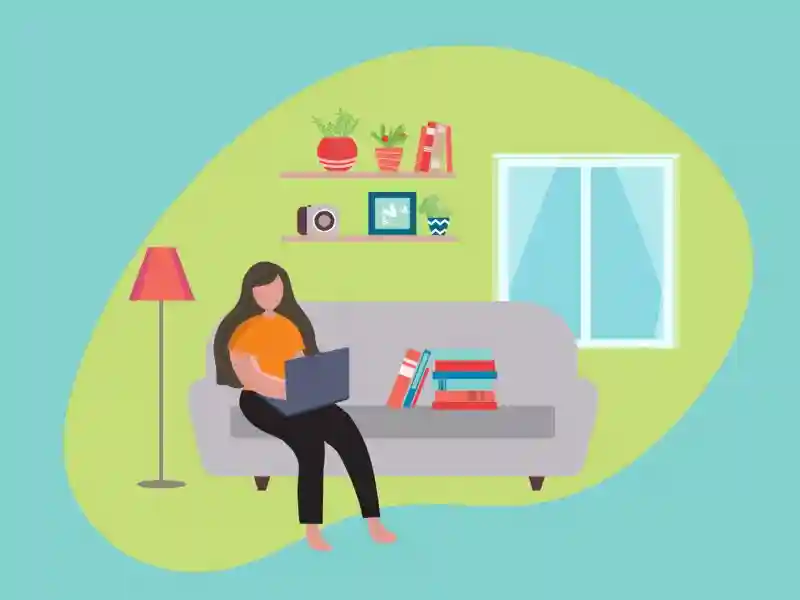Being an International Grad Student in the Pandemic

By Emīlija Sarma
It goes without saying that the past couple of months have been very rough for everyone and, perhaps, particularly in some ways if you are an international student. The pandemic changed all of our lives so drastically that it is sometimes hard to wrap your head around it.
While some international students had to return to their home countries at the start of the pandemic, others, like me, had to stay in the U.S. and find a way to adapt to the demands of the current situation here. This has presented a variety of challenges that I could have never anticipated.
My family are all in Latvia except for one sibling currently living in Poland. Usually, I am very lucky to be able to go home for a few weeks every summer to see my family and get some things done back home that I can’t really do here in the U.S. (i.e. dentist appointments, specific doctor’s appointments, hair appointments, and very, very many “food appointments!”).
However, this June marks the longest time that I’ve been apart from the people I love most. It’s been extremely difficult to be on the other side of the world in the midst of a global pandemic. As other international students in similar situations will probably relate to, I’ve had many a panicked phone call waiting for a family member’s test results for Covid-19, many nights without sleep, and very angry messages exchanged with my grandmother who doesn’t understand the concept of “social distancing.”
I’m a worrier by nature (it’s probably what I do best, aside from making pancakes), and I also have a compulsive need to feel in control over all things. This has proven to be the perfect storm in the pandemic as I’ve come to realize just how very little I actually have control over.
I’m still in the process of reigning in my anxiety over my family and what will happen to the world in the future. But there are certain things I’m trying to focus on while all of this is happening that you might find useful as well. Here are some steps that I’ve taken so far and things I aspire to improve on:
1. Getting into a routine
Due to our campus being closed, all non-essential university staff like myself are working remotely. I desperately miss my office, seeing my lovely colleagues, and getting my favorite coffee on campus. I miss the luxury of having double monitors and the endless parade of birthday cakes and donuts, or random pastries someone in the office would bring in every other day. I miss seeing other students... This list could go on forever.
The point is, I had a wonderful routine and now it’s gone. I love routines because I’m a wild tornado of a person without them. I need to have a purpose, a place to go to complete a specific set of tasks, and people to interact with as I’m completing said tasks.
If I don’t have to wake up at a specific time in the morning to go to my office on campus, I will probably skip steps 1-7 in between waking up and sitting down to work on my laptop. (For reference, steps 1-7, for me, include such activities as showering, getting dressed, eating, and other basic human needs.)
As any graduate student will probably tell you, the graduate student mindset is that “Work is #1.” Your research, your writing, your graduate assistantship — all of that is your top priority and we tend to forget about the importance of our physical health and mental wellbeing.
It has been a real challenge forcing myself to do “normal people things” when I no longer leave my house to go to campus, and I can just sit in my pajamas during virtual staff meetings with no video feed. I had no idea how much effort it would take me to do all of the things I took for granted before the pandemic started. I realize that I’ve relied on the outside world for structure, but I now have to create this structure by myself.
I hope that most of you are much, much better at this than I am, but for me, it continues to be an uphill battle. I am happy to report that while I still do sit down to work right after I wake up, I force myself to take a break and do all the other human things I need to do somewhere in between. I highly recommend trying to set reminders for yourself on your phone even for the most basic things that you need to accomplish in your day. This will help keep you on track and keep you accountable.
2. Realizing that you and everyone else is doing their best
Like your typical graduate student, I give myself a really hard time if I feel like I’m not on top of things. With what’s going on right now, it’s very easy to feel like you’re behind on every task, every project, and every assignment in one way or another.
It’s so important that you give yourself permission to not be perfect and up to speed on everything right now. I think guilt is like this sticky honey pot that is very easy to fall into. You’re a fly circling this pot, thinking, “Maybe I’ll just have a tiny drop...” but before you know it, the honey’s stuck to you — wings and all, and you’re going down, sinking. It’s easy to wallow in guilt and punish yourself over things that are objectively not your fault. It’s difficult to tell yourself that you are trying your hardest. But that is exactly what you have to do — now more than ever.
We’re all out here, not knowing what tomorrow will bring, sitting in our pajamas, yelling at our parents through the screen halfway around the world. (No? Just me? Ok.) Be kind to yourself and be kind to others — that's the very best thing anyone can do.
3. Be proactive (even when you really, really, really don’t want to)
I never used to enjoy or appreciate walks. Before, I always felt like I needed a purpose whenever I stepped outside the door. If we’re going for a walk, my first question would be “Great! Where are we walking to and why?” followed closely by “Will there be food at the end of the journey?” (You can see very clearly what my primary motivators are in life.)
Now, I am a changed woman. I want to go outside just to be outside. Suddenly, I realize that there are trees out there. There are also a whole bunch of very colorful birds that I don’t know the names of. (My fiancé often insists that they’re hawks. Alright, at least one of them is a hawk, sure. Likely 99.5% of them are not hawks, though.)
Whenever I start feeling all the feelings, I force myself to go outside. Just the act of breathing fresh air, seeing the birds (some of which may be hawks), rediscovering the basic motor functions of my body (like moving my legs) — it makes me feel grounded. Being outside forces me to stay in the present. The practice of staying in the present is the most valuable thing I’ve discovered in the last couple of years dealing with anxiety — aka the grad student’s constant companion.
Even when I really, really don’t want to do anything to help myself feel better, I make myself get up, get dressed, and go on a bike ride or just a walk on the trail near my house. Admittedly, sometimes it’s not so much me as it is my fiancé who makes me do this, but the point is, it works 100% of the time. Change of scenery does wonders.
4. Find your people and reach out!
Every international student learns very early on that if you’re far away from home and your family, you will have to work fast to make friends and build a support system for yourself. If you’re yet to set out on this journey — fear not, this will happen in the blink of an eye! You will meet the most incredible and inspiring people during your study abroad, and they will change your life. I know that they certainly changed mine.
My friends here in the U.S. — domestic and international students alike — are an incredible source of joy, inspiration, and knowledge for me. International students build their own little families abroad, and my family here has had a tremendous impact on me. I can always count on my friends for help when times are tough, and it's been particularly important to hold onto that during the pandemic.
It can be tempting to bottle up your feelings, especially if you feel like you don’t want to be a burden to anyone who might also be going through a rough time right now. But if you give your friends a call every now and then to share how you’re feeling, you will also give them a chance to share with you in return. Don’t be afraid to reach out!
Though we can’t be together physically, there are so many other ways to keep in touch. If this pandemic has taught us anything, it’s that people are social creatures—we need each other. Show up for the people who matter to you and let them know that you care about them! There was never a more important time to do this.
I hope that some of this has been helpful to you and that I’ve inspired you to change out of your pajamas. But hey, you do you — no judgment! Be kind to yourself, take a walk outside, and talk to others about how you’re feeling. One way or another, we can come out of this stronger than when we started.

Emīlija Sarma is a Fulbright scholar from Latvia and a PhD candidate in comparative literature and cultural studies at the University of Arkansas, Fayetteville.

























